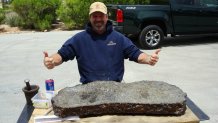A gold-flecked meteorite that has traveled from the asteroid belt near Mars to the mountains of Fukang, China, and finally Marin County, California, is at the center of a vicious ownership battle being waged in federal court.
The 227-pound iron "pallasite" meteorite is estimated to be 4.5 billion years old. First discovered in Fukang, China about 15 years ago, it could be worth as much as $1 million, according to Stephen Settgast, an asteroid collecter who claims he's the rightful owner.
He sued a museum in Maine and a New York meteorite expert in February alleging breach of contract over the sale of the meteorite. But they have now filed a counterclaim, alleging that Settgast, who is staying in Marin County, is behind a "blatant theft of a unique and precious meteorite."
The countersuit alleges Settgast sold the meteorite for $425,000, then engaged in an "outrageous act of seller’s remorse" by stealing back the space rock for himself.
"This isn't a typical theft," said Wayne Minckley, undersheriff in Miami County, Kansas, in a Skype interview with NBC Bay Area.
A sheriff is involved in the out-of-this-world case because authorities aren’t yet ready to decide who stole the meteorite until the suit is settled.
"It’s a complicated case in the mere fact that the individual who sold it to the folks in Maine is our suspect in the theft," Minckley said.
Local
Settgast would not speak on the record. But his attorney, Curt Edmonson of the Oregon firm, Slinde Nelson Stanford, said this is a simple business dispute gone awry.
"Civil suits don’t use terms like ‘steal.' That’s a criminal term," he said. "We didn’t go over the top in our complaint, but they certainly went over the top in their counterclaims."
But Settgast's story is full of holes, according to the founders of the Maine Mineral and Gem Museum — Lawrence Stifler and Mary McFadden of Brookline, Massachusetts — and meteorite expert Darryl Pitt, of New York. All three filed the counterclaim on March 29.
In the suit, Jeff Valle, the trio's Los Angeles attorney, laid out his clients’ argument like this: Noted for his ability to spot beauty and value in meteorites, Pitt suggested to the museum founders that they buy the meteorite in question. Stifler and McFadden agreed to pay Settgast $425,000 to feature the "Fukang meteorite" in their museum, which is not yet open.
In August 2014, Pitt brokered the deal with Settgast. The final of three payments was made in February 2015, the counterclaim contends. According to his website biography, Pitt is the purveyor of the "world's foremost collection of aesthetic iron meteorites," which he describes as "extraterrestrial objects d'art."
Valle and Pitt have declined to be interviewed.

After the money was paid, Pitt and the museum founders waited for the meteorite to be cleaned up and prepared by Kansas duo Keith and Dana Jenkerson, of KD Meteorites. The couple's website twinkles with brightly lit stars and boasts they've been "chasing meteorites since 1990s."
The Jenkersons took almost two years to stabilize, restore and prepare the "Fukang meteorite," the countersuit alleges, and on Jan. 10, Keith Jenkerson told Pitt this was "one of the most awesome meteorites to ever be displayed." He guessed the spiffed-up space rock to now be worth $1 million. But Pitt and the museum founders said this higher price is wildly inflated, the counterclaim states.
Less than two weeks later, the meteorite was reported stolen.
Pitt and the museum founders allege that Settgast, whose lawyer described him as a "world-renowned" fossil hunter who also has a ranch in Montana, went into the Jenkersons' lab on Jan. 23 and stole back the meteorite. Settgast's attorneys claim a condition of the sale was that the meteorite couldn't be shown in a public museum, a point the museum founders' say is simply not true, the counterclaim contends.
How Settgast would have gotten the meteorite out of the lab, at the Jenkersons' home in Osawatomie, Kansas, without detection, and then to Marin County, where Settgast has been living with a relative, has not been clearly explained.
Minckley, from the sheriff’s office, reiterated that it’s his understanding Settgast stole the meteorite from the lab. He said there was no surveillance video to document what might have happened. His office, however, is reserving a final determination on whether a crime was committed, and by whom, until a federal judge makes a ruling on who really owns the meteorite.
As for why the sheriff’s department is letting the civil case play out first, Edmonson said: "That tells you a little bit about how they feel about the criminal action. If they don’t feel there is enough evidence for the claim of theft, then it’s not there."
A hearing is set for June to be heard by Oakland-based U.S District Court Judge Saundra Brown Armstrong.



